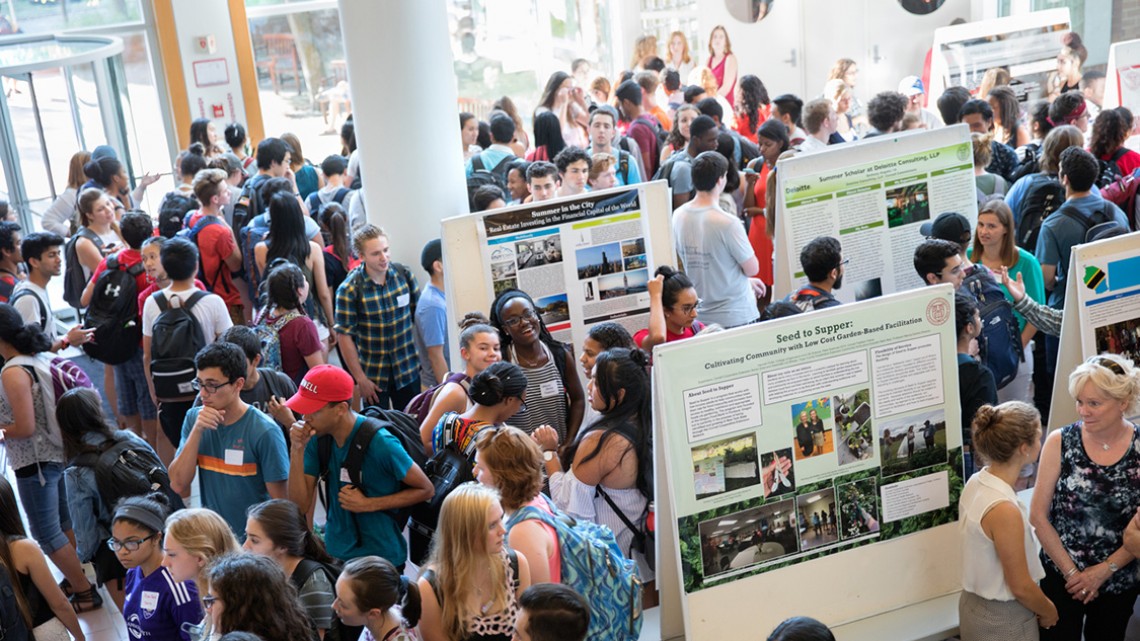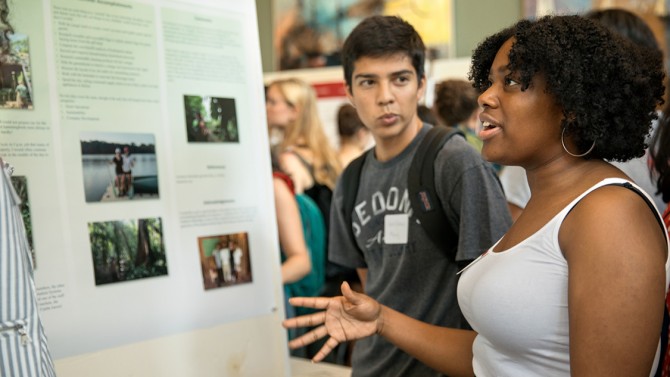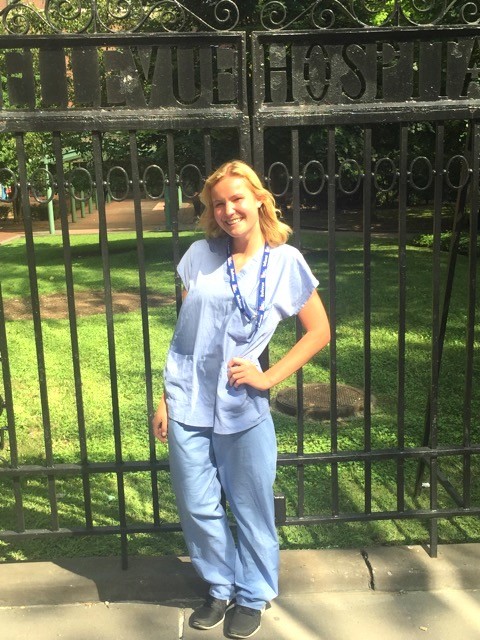
Several hundred students gathered at the Cornell Commitment event Sept. 27 to view posters and hear panel discussions on how student scholars spent their summer.
Cornell Commitment interns reflect on summer experiences
By Blaine Friedlander
As an undergraduate intern in the emergency room of New York City’s Bellevue Hospital, Rachel Marks ’19 glanced down at the stump of a homeless man’s amputated leg. “His injury was infected and swarming with maggots, hundreds of them, completely covering the wound and crawling over his sheets,” she said.
“A doctor then approached the man and began talking to him. The resident was polite and kind,” Marks said. “I watched in awe as the doctor removed them, one by one, and cleansed the infected area.”
Marks, a biology major who aims to become a doctor, explored several specialties last summer at Bellevue, including its level 1 trauma center, where she was placed with an emergency medical team and handed gauze and other materials to the physicians.
“I will always think back to that moment this summer, because it exemplifies the great character that a doctor should possess. That doctor’s compassion with that man will serve as a model for me as I journey down my own path to medical school,” she said.
About 30 students from the Cornell Commitment office – Meinig scholars, Rawlings research scholars and Cornell Tradition fellows – presented posters and panel discussions Sept. 27 on how they spent their summer interning with local, national and international organizations.
Katie Donnelly Moran ’18 spent her summer in Dodoma, Tanzania, learning about food insecurity; 47 percent of the households she interviewed were food insecure. Donnelly Moran worked with Xavier Salvador ’19 and was supported by the College of Agriculture and Life Sciences' Global Fellows Program, who facilitated their partnership with the Diocese of Central Tanganyika’s Development Office.
“With the help of translators and village guides, we administered the survey. This was my first time conducting hands-on research,” Donnelly said, explaining that they noted household demographics, farm practices and yield. “Through preparation and the warmth of my hosting organization, my experience was better than I could have imagined.”
For the past two summers Ehab Ebeid ’19, an urban and regional studies major, made the world a little greener. More than 20,000 commuters daily use Washington’s crowded north-south 16th Street corridor. He analyzed traffic data that could speed transit bus routes, help untangle traffic and provide real-time information for commuters.
Ebeid attended public meetings and studied policy decisions. “I loved interning and doing research there,” he said.
Freshmen entering the Cornell Commitment program – which has about 900 students – attended the poster sessions and talks. Victor Odiwuour ’21 said the upperclassmen seemed quite engaged: “It’s very inspiring to see these student projects, and I appreciate that it took time for the research and to present it.”
Said Sofian Albayati: “This program gives us an opportunity to widen our perspectives, meet new people and engage.”
Kierra Grayson ’19 interned at a Montessori school at Kumasi, Ghana, through a collaboration between Cornell and the United Nations on behalf of the Voices of African Mothers Foundation, a group that supports African women.
Grayson admired the kindergarten and first-grade children who were learning English pronouns and fractions. As a development sociology major, she observed social structures, familial backgrounds and education.
“I want to know how families are manifested into overall life health. This internship was a chance to observe what the culture was like and the value of health in their community,” she said.
“Personally, the internship was a very introspective experience, as it taught me a lot about myself and career goals … and it taught me how to be comfortable when you’re uncomfortable.”
Media Contact
Get Cornell news delivered right to your inbox.
Subscribe
